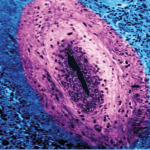Why Volunteer?
Dr. Manno has served as the chair of the Committee on Education since 2021 and has been volunteering for the ACR since 2011. Admittedly, her initial involvement was a happy accident: A colleague was out on maternity leave and asked for coverage. She stepped onto the Annual Meeting Planning Committee and helped plan the Knowledge Bowl. After that, she was hooked.
“This is a unique opportunity to help create educational content and disseminate that material to other providers and trainees,” she says. “It’s also a great way to network with rheumatology colleagues from around the world, all of whom are doing different things. The people are what make the volunteer experience exceptional.”
Personally, I’ve volunteered for the ACR’s Insurance Subcommittee since 2021. I’ll be honest: I applied to pad my curriculum vitae. But what I’ve gotten out of the experience far exceeds a checkbox on a résumé.
When I joined the Insurance Subcommittee, I knew next to nothing about insurance companies, healthcare policy or advocacy. That has changed. Last year, I even visited Capitol Hill to advocate on behalf of the ACR. It has been a pleasure to work with rheumatologists from across the country to advocate for patient access to rheumatologic care on a national scale. When my time is up on the Insurance Subcommittee, you can bet my next stop is the Committee on Education. Suffice it to say, the ACR has found a volunteer for life.
Whatever your motivation may be, volunteering for an ACR committee/subcommittee is a rewarding experience. Dr. Manno and I can’t recommend it highly enough.
Conclusion
Applications to the Committee on Education subcommittees closed on Aug. 1. If you missed your chance this time around, don’t worry. The ACR is always looking for volunteers. Keep an eye out for next year’s application cycle. Updates can be found at https://rheumatology.org/committees.
 Samantha C. Shapiro, MD, is the executive editor of Harrison’s Principles of Internal Medicine. As a clinician educator, she practices telerheumatology and writes for both medical and lay audiences.
Samantha C. Shapiro, MD, is the executive editor of Harrison’s Principles of Internal Medicine. As a clinician educator, she practices telerheumatology and writes for both medical and lay audiences.


